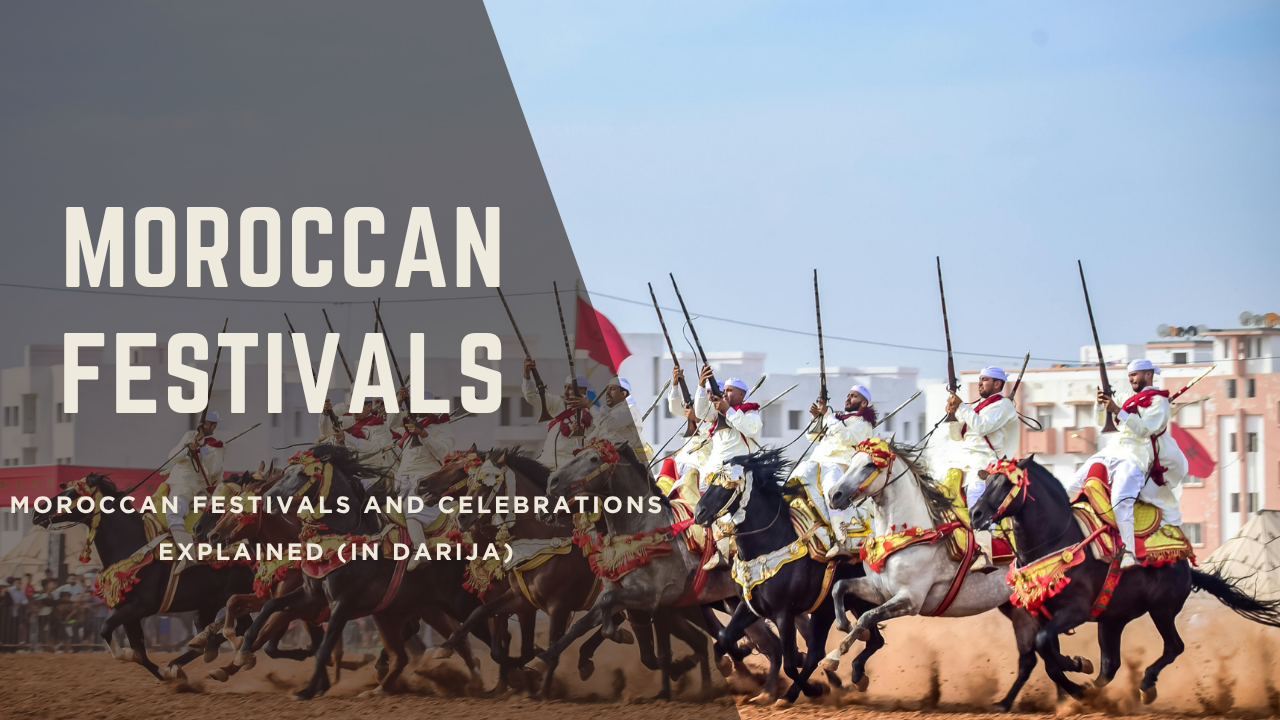Moroccan Festivals and Celebrations Explained (in Darija)

Introduction
Morocco is a country that loves to celebrate — from religious holidays to cultural festivals, there’s always a reason to gather, eat, dance, and share joy.
In this post, you’ll discover the most popular Moroccan festivals and celebrations, how people enjoy them, and some key Darija words and phrases to help you join the fun!
1. 3id Sghir– Eid al-Fitr
After the holy month of Ramadan, Moroccans celebrate 3id Lfitr, also called Eïd Sghir — “the small feast.”
It’s a time of joy, family visits, and delicious sweets like Shebakiya, kaab ghzal, and ghriba.
Darija phrases:
3id mubarak said! → “Happy blessed Eid!”
Kul 3am o nta bikhir! → “May you be well every year!”
Bghit n3ayad m3a lfamila. → “I want to celebrate Eid with my family.”
Children receive new clothes and money (3idiya), and families visit each other with big smiles and hugs.
2. 3id Lakbir – Eid al-Adha
Also called Aïd al-Kabir or L3id Lkbir, this is the biggest religious celebration in Morocco.
It honors the story of Prophet Ibrahim (Abraham) and his son, and families sacrifice a sheep in remembrance.
Darija phrases:
L3id Lakbir ja! → “Eid al-Adha is here!”
Bghina nashriw l7awli. → “We want to buy the Eid sacrifice.”
Lah ya9bel mna wa menkom. → “May God accept from us and from you.”
The day is full of gratitude, family meals, and neighborhood joy.
After the prayer, everyone shares mrouzia (a sweet meat dish with raisins and almonds) and grilled lamb — meshwi.
3. 3ashura
Ashura is a unique Moroccan celebration with religious and cultural traditions.
It happens on the 10th day of the Islamic month of Muharram.
Children play with water, light small bonfires, and receive toys — it’s almost like a Moroccan kids’ festival!
Darija phrases:
Lyoma 3ashura! → “Today is Ashura!”
Rashitini b lma! → “You splashed me with water!”
Bghina nashriw t3araj o lo3ab. → “We want to buy drums and toys.”
Families also prepare a special couscous and give charity known as zakat 3ashoura.
4. Mawlid Nabawi
This festival celebrates the birth of the Prophet Muhammad (peace be upon him).
It’s called Mawlid Nabawi or Lmoulod Nbi in Darija.
People light candles, recite prayers, and enjoy sweets like sfof or sellou.
In some cities, you’ll see street processions and religious chanting — especially in Meknes and Fez.
Darija phrases:
Mawlid NabawiNbi mubarak! → “Blessed Prophet’s birthday!”
Nashriw shwiya dyal sellou. → “Let’s buy some sellou.”
Kan7taflo b lmoulod f lmasjid. → “We’re celebrating Mawlid at the mosque.”
5. Amazigh New Year – Yennayer (ⵢⵏⵏⴰⵢⵔ)
The Amazigh people (Berbers) celebrate their New Year, called Yennayer, every January 12–13.
It marks the start of the Amazigh agricultural calendar, and it’s becoming more popular across Morocco.
Families prepare traditional dishes like couscous b lkhodra (vegetable couscous) and sometimes hide a date or almond — whoever finds it gets good luck!
Darija phrases:
Asggas ameggaz! (Amazigh) → “Happy New Year!”
3andkom shi to9os dyal Yennayer? → “Do you have any traditions for Yennayer?”
Kan7taflo b l3am l Amazighi. → “We’re celebrating Amazigh New Year.”
6. Cultural & Music Festivals
Morocco is also famous for its world-class cultural and music festivals, which attract visitors from around the world.
Here are some of the most popular:
- Mawazine (Rabat) – One of the biggest music festivals in Africa, featuring Moroccan and international artists.
- Marrakech International Film Festival – Celebrating cinema and creativity.
- Gnaoua Festival (Essaouira) – A magical mix of African, jazz, and spiritual music.
- Fès Festival of Sacred Music – A beautiful blend of cultures and faiths.
Darija phrases:
Ghadi lMawazine. → “I’m going to Mawazine.”
Kaynin fnanin kayghaniw Gnaoua. → “There are artists performing Gnaoua music.”
Bghit nshuf film f lfestival. → “I want to watch a movie at the festival.”
7. Weddings, Henna, and Personal Celebrations
Apart from national and religious holidays, Moroccans also love personal celebrations — like weddings (l3ers), births (sbou3), and engagements (khṭba).
These events are full of music, dancing, and family gatherings.
Henna (7na) plays a big role, especially in weddings, symbolizing beauty and blessing.
Darija phrases:
Mabrouk l3ers! → “Congratulations on the wedding!”
Bghina ndiro l7na → “We want to apply henna.”
Sbou3 dyal dri sghir. → “The baby’s seventh-day celebration.”
Vocabulary Recap
| English | Darija | |
|---|---|---|
| Eid al-Fitr | 3id sghir | |
| Eid al-Adha | 3id Lakbir | |
| Ashura | 3ashura | |
| Mawlid | Molod Nabawi | |
| Amazigh New Year | Yennayer | |
| Wedding | l3ers | |
| Festival | lmihrajan | |
| Music | lmusi9a | |
| Joy | lfar7a |
Why Festivals Matter in Morocco
In Morocco, every festival — big or small — brings people together.
It’s not just about food or music; it’s about connection, gratitude, and shared joy.
Learning these traditions (and their Darija words) helps you understand Morocco on a deeper, more human level.
Learn Darija, Live the Culture
At Daily Darija, we don’t just teach words — we teach culture, connection, and confidence.
Whether you want to talk about Ramadan, weddings, or Moroccan festivals, our courses give you the tools to sound natural and understand the real Morocco.
🎯 Start learning today: Daily Darija Courses

